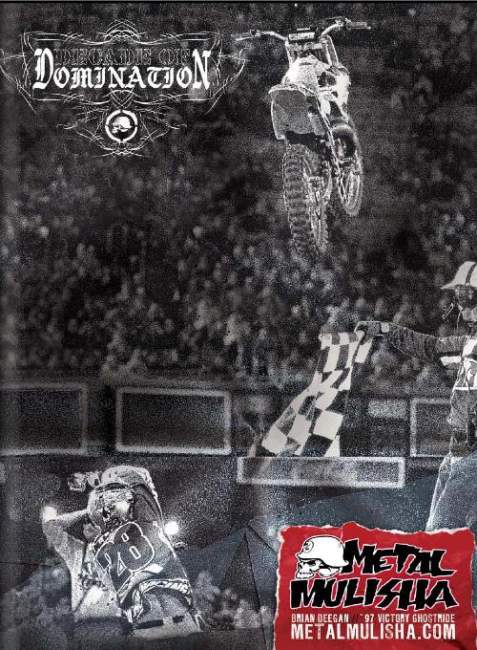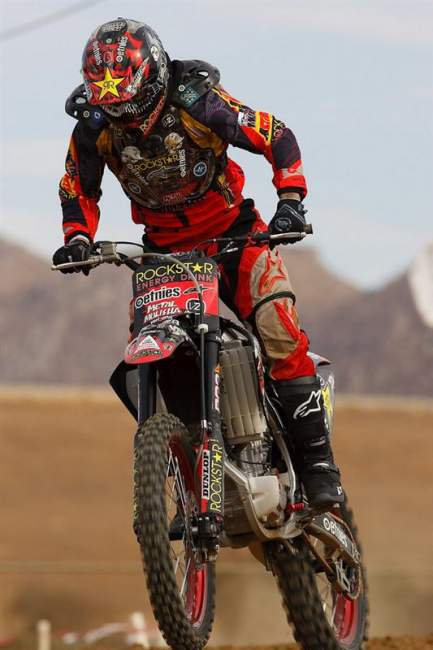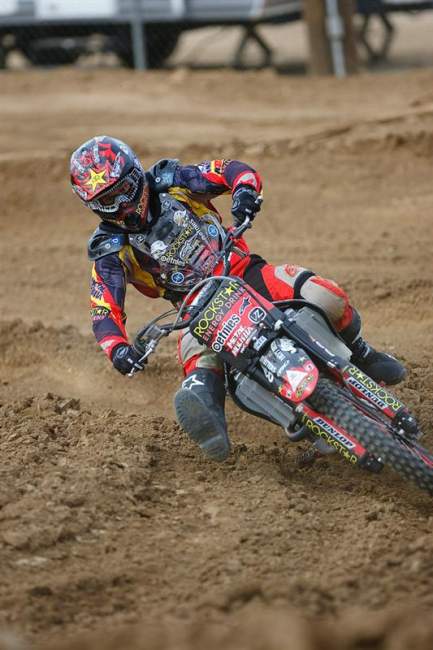“All I have to say is the first time I won in supercross, I promised myself I would do something that no one else has done yet,” said a very young Brian Deegan while standing atop the victory podium. “And I’m glad everyone was here to see me kick everyone’s ass!” he added for good measure.
The crowd of nearly 60,000 fans roared in approval.
It was Saturday evening, January 18, 1997, and while relatively little known Team Moto XXX privateer Brian Deegan had not only convincingly won the AMA 125cc West Region main event over factory riders such as Robbie Reynard, David Vuillemin and Kevin Windham, when he met the checkered flag he shoved himself off the back of bone stock RM125 and ghosted it well off into the South Central Los Angeles night air.
“I bought my own bike,” Deegan would say to me I the pits later that night. “I mean I went down and paid $4,000 for it. I’m a true privateer and I won.”
While today Bran Deegan is one of the most recognized, and to thousands, beloved action sports in, well, action sports history, back in the winter of 1997, he was living hand-to-mouth as a full-on privateer, living on a friend’s couch in Southern California. Certainly a long ways away from becoming a multi-millionaire with his own freestyle motocross team and line of toys and action figures lining the walls of the Wal-Marts of America, Deegan, street smarts, natural business acumen and all, he kept at it to where now, in 2008, he’s built is own Meal Mulsiha-themed empire. Using the L.A. Coliseum video as inspiration, this afternoon we sought out the Commander in Chief of all things freestyle motocross for a State of the Metal Mulisha Union Address.
Racer X: Brian, the video of you winning the 1997 AMA 125cc West Region Supercross main event in the Los Angeles Coliseum and ghost riding your bike across the finish line is up on a number of sites right now. I watched the thing like eight times in a row this afternoon. Have you gone back and watched it?
Brian Deegan: Yeah, it was pretty cool, you know? At the time it was pretty exciting, but you forget over time on how. You forget how big an accomplishment it really was for me, you know? It’s one of those things I can always look back on and be proud of. For a lot of people, their racing career goes by, but I’ll always have that one memory that I think made it all worth it. It was one of those memories I don’t think 99% of the racers would have. I have something like that to be proud of for all the work I put in racing dirt bikes.
You rode really well throughout the entire 15-lap main. Were you surprised at how good you looked in the race?
Yeah, it’s funny because I was watching that and I was like, “Man, I was hauling ass.” I really looked like I was faster than all the other guys. My speed and style and everything looked like a full-on pro and like a guy who could win a supercross championship. You know, it kind of bums me out that you can see that see that and see 15 laps of me riding that good and I still didn’t get any support.
That bike was a stock Suzuki that I bought at Simi Valley Suzuki for like $4,000. It was a stock bike with a pipe and silencer and I had Pro Circuit do the head and cylinder, so it was pretty much a production bike with a few modifications.
Right after the race, you had a few things to say on the podium that, as far as I know, have never been said before or since. What did you think about all that?
It was cool. It was crazy. I was super-young.
It was during that same period in time that you guys were just beginning to get the Metal Mulsiha off the ground, wasn’t it?
[The year] 1997 was actually was the fist time I started writing Meal Mulisha on my bike and helmet. I still have the helmet that says “Metal Mulisha” in marker that I won the supercross with. I think that moment that I decided to ride for Moto XXX that I was just really rebelling against everything and wanted to do something different. That night in the Coliseum really launched the attitude and the Mulisha. Ghost riding the bike and doing everything that you weren’t supposed to do, I petty much did. Then I got on the podium and pretty much said what I thought and I how I felt and I wasn’t afraid to say it. I pretty much told everyone that I kicked everyone’s ass. I just said stuff that people normally don’t say or hear from the podium and that carried into freestyle and the Metal Mulisha and us being ourselves and saying what we wanted to say. That was a big launching point for us. From that point, from winning the supercross, ghost riding the bike and doing all the Crusty [Demons of Dirt] that year and doing the Moto XXX movies and doing the skits. It all started that year. People wanted to bash it, but you know, I won a supercross and we had a lot of stuff to back it up.
Then later that summer you showed up at the Washougal National with gold glitter all over your bike, boots and helmet. I remember standing in your pit area and Ryan Hughes walking by the bike and smiling. Some people, like Ryan, seemed to get a kick out of it. On the other hand, many others didn’t...
Yeah, you see a lot of people don’t remember that. I still have that helmet, too. We were in Washougal and I decided to glitter my whole bike, helmet and gear. I just knew it would bum so many people out. All the factories and the teams were looking at us like we were a bunch of screw-offs. I ended up crashing on the start of the first moto, but in the second moto I came out and was like top five or six the whole race and battling with [Mickael] Pichon and [Stephane] Roncada on a glitter bike. It was just funny. I knew it just pissed them off. They couldn’t pass me on my glitter bike. It was just another chapter in the story of us pushing and breaking rules that really weren’t even there. People wanted to shut us down, but there was really no way to do it. It was like, “We’re mad at you for being different! We’re mad at you for being cooler than we are!” It was all kind of funny.
Yeah, you know freestyle started in 1998 as a competition sport. Like we put on the very first freestyle demo at the end of 1997. We had Death Metal bands and freestyle motocross and a jump park built by Micky Dymond. Then, in 1998, they started a small freestyle series and it did all right. Then in 1999 the X Games picked it up and that’s when it really hit. By that point, I was already in deep and was like, “I broke my arm at the very first supercross race in the January of 1999. I‘m over racing. I’m not getting any support. I have no money and I’m broke.” So I focused on freestyle. I was getting paid by companies to ride freestyle. I was stoked. So I started going crazy and I was doing all these commercials and all this stuff for action sports. Then, X Games happened. It was like myself as the bad guy and [Travis] Pastrana as the good guy and we took it to the next level. All of a sudden, we had all these cameras on us and we just smoked all the other sports in our very first year.
Brian, what would you say was the top moment of your entire freestyle motocross career?
The first moment that comes to mind, it’s like my biggest moment, would be doing the first 360 at the 2003 X Games at the Coliseum. I stuck the 360 before Pastrana. It was the first time I ever did it on dirt. I just barely landed it and I think people were just tripping, you know? People were blown away by it. In the end, that was the biggest moment. You know the other thing I have to say is that another major accomplishment was being the guy that built freestyle motocross. I mean, look around... I’m one of the only dudes left that is an OG guy that started the sport that still competes. I think the longevity with that and the Mulisha being built and still going strong and us having the sickest team in action sports is a huge accomplishment. I think it might be the biggest besides what Tony Hawk has pulled off, you know?
Okay, so what’s in your two-wheel future?
I feel good and I ride the tracks a lot. I ride every day. I feel fast and I feel in good shape. I hired a trainer. I look at age and I think, “Yeah, I’m getting older, but I still feel good and I’m in better shape than I’ve ever been. I feel fast. I still want to compete. I want to ride X Games. I want to do Step-Up, and Speed and Style is like a new challenge I want to take it on and I think I can win a medal in that event. So I still want to ride dirt bikes. I want to compete at X Games still. That’s my deal. I feel good. I want to compete. I told X Games, “Hey, if you got a spot open over at Dubai for supercross for the next X Games, let me know. I’ll race supercross just for fun, you know?” At this point I feel no pressure. Anything I do, I do it for fun.
{LINKS}Okay, brother, what else do you want to toss in?
Obviously, the Metal Mulisha is taking off. I’ll have the whole truck-racing deal going on. And next year I’ll have a full-line of off-road trucks and freestyle bikes and action figures and remote control toys coming into Wal-Mart. They’re already in the stores, actually. That’s been like a huge accomplishment. I’ll go to Wal-Mart and I look and I have a two-foot-wide section from the floor to the ceiling. I’ll look at Tony Hawk’s section and it’s smaller than mine and I think, “Man, I must be doing something right.” Out of all the guys... I know there’re are guys that ride better than me and have better style and all that, but I always think, “Somehow I pulled it off, you know? I did it the right way and everything worked out for me.”





